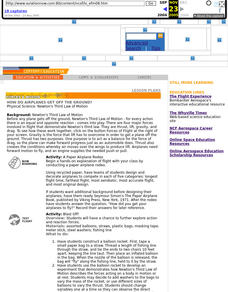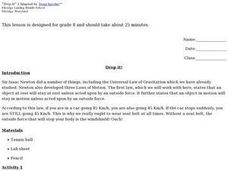Curated OER
Push or Pull
Students discover that one way to change how something is moving is to give it a push or a pull. They design their own boats and work with 'The Great Boat Push' worksheet to compare how their boats move when they are pushed or pulled and...
Curated OER
The Basics: Physical Science
Learners view a video on friction and examine how friction and gravity affect some sports. In this investigative instructional activity students write a paragraph and draw a picture that illustrates how friction and gravity affect...
Curated OER
Let's Do the Wave!
Learners distinguish waves from matter, differentiate between transverse and longitudinal waves, use sine curves as representations of transverse waves, label characteristic properties of waves, diagram transverse waves having specific...
Curated OER
Trajectory and Range of a Projectile
Students investigate the factors affecting projectile trajectory. In this physics lesson, students calculate the range, time and speed of projectiles using mathematical equations.
Curated OER
Elements of Physics: Energy And Work
Students examine the difference between potential and kinetic energy. In this energy lesson students view a video and apply these energies to real world situations.
Curated OER
Secrets of Lost Empires II -- Roman Bath
Students build an arch with no mortar following the design of the Romans. They use cookies to represent the blocks used and work to distribute the weight on the stones.
Curated OER
The Science of Hurricanes
Learners explore hurricanes. In this science lesson, students discuss the aspects of hurricanes and watch videos of hurricanes. Learners discuss the motion of the hurricanes.
Curated OER
Roll On
Second graders, in groups, develop models to show how forces such as gravity, friction, equal, unequal forces and change in direction work on marbles.
Curated OER
Physics Rewind
Eighth graders differentiate speed and velocity. In this physics lesson, 8th graders explain Newton's laws of motion. They calculate speed using a mathematical formula.
Curated OER
Fundamental Terms
Students explore Newton's Laws of Motion and how they apply to flight.
LABScI
Projectiles: Target Practice
Angry Birds prepared them, but now pupils must prove their skills with projectiles! Scholars test different variables to determine which ones impact the distance the projectile flies. The experiment provides connections to kinetic and...
Curated OER
The Legendary Raptors
How are raptors and airplanes alike? Combine science and language arts in this fun and interactive project. Young scientists research the animal in order to design their own aircraft, and compete in a contest for farthest, fastest, and...
Curated OER
Action-Reaction! Rocket
Students construct a rocket from a balloon propelled along a guide string. They use this model to learn about Newton's three laws of motion, examining the effect of different forces on the motion of the rocket. They measure the distance...
Physics Classroom
Action-Reaction Lab
Computer-interfaced motion detectors are required to carry out this inquiry. It is a new twist on exploring motion with plunger carts: they are set back-to-back and then propelled away from each other. Their velocities are measured, and...
NTTI
Vectors: Traveling, But in What Direction
High schoolers watch a video of real-world situations regarding speed, direction, velocity, force, etc. and answer questions while viewing. They then practice drawing and using vectors to solve more real-world problems.
Curated OER
Sports and Science
Using footballs, basketballs, tennis balls, and more, learners conduct experiments to illustrate Newton's Laws of Motion. The experiments are conducted outside, and require them to throw, kick, and hit a variety of balls. Your...
EngageNY
Why Are Vectors Useful? 1
How do vectors help make problem solving more efficient? Math scholars use vectors to represent different phenomenon and calculate resultant vectors to answer questions. Problems vary from modeling airplane motion to the path of a...
Curated OER
Transforming Energy
Super detailed, this lesson will educate physical science learners about the flow of electrons. Begin by reviewing potential and kinetic energy with a moving pendulum, and then get them online to observe interactive websites about...
Curated OER
Energy At Play
If you can find Tinker Toys™, then this may be a fun assignment for your physical science class. Using the construction set and a few other toys, they examine the forces involved when it they are being played with. For each, they...
Institute of Electrical and Electronics Engineers
Blast Off!
With the use of a model rocket kit, aspiring aerospace engineers work cooperatively to construct and launch a rocket. A preparatory reading assignment is included, covering Newton's laws of motion and information about the first...
Curated OER
Falling
Students should describe the path that the motion would take as well as what might begin or stop the motion. The common characteristic of all the motions that students have experienced directly is that one or more forces are acting on...
Curated OER
How Do Airplanes Get Off the Ground
Students construct various types of paper airplanes, exploring action and reaction forces by conducting a paper airplane rodeo. Students then discuss how Newton's Third Law of Motion affected their planes.
Curated OER
Drop It!
Eighth graders explore Newton's Law of Motion that states that an object at rest stay at rest unless acted upon by an outside force and that an object in motion stay in motion unless acted upon by an outside force.
Curated OER
Rollin' On
Third graders investigate the effects of gravity on the motion of a marble on an inclined plane and a declined plane. They work in small cooperative groups to predict and explain outcomes.























